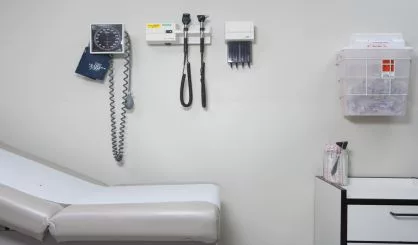
With COVID-19 raging, Van Buren Cass District Health Department Health Officer Danielle Persky is making an appeal to the community not to give up. In a letter she released Friday, Persky writes, “During the summertime, I watched as my team and I started to heal. Morale was coming back, stress levels were dipping, and normal operations were beginning to sprout again.” That, she tells WSJM News, is when people let their guard down, and now, everyone needs to put it back up.
“We have hit a surge again, and really, it’s running rampant,” Persky said. “COVID is making a big impact in the southwest Michigan corner, and it’s becoming increasingly difficult to get under control.”
Persky says hospitals in the region are full, and Omicron is on the way.
“Part of my plea is to recognize that we’ve got to get COVID under control even before this new variant hits. I don’t think it’s a matter of if it will, but when it will.”
Persky says people set aside masks, sanitation, and vaccinations as cases dipped in the summer. Many communities were distracted by fighting over mask rules in schools. Now hospitals in Cass and Van Buren counties have to transfer patients to larger hospitals, which are themselves close to full. They could hit a breaking point.
“I think that’s exactly what we’re anticipating, that these hospitals will hit a breaking point, certainly for their non-urgent patients that they’re tending to. They’re not able to see them right now.”
Persky asks everyone to do something to increase their own COVID protection efforts. Mask when in public and get boosted. Between November 17 and 24 in Cass and Van Buren, they recorded 1,007 cases. Last year during the same week, they recorded 651.
Persky’s full letter is below:
How many people would still be alive if not for COVID? How many more loved ones and people in our lives will we lose to this virus? We many never know. It takes a toll to witness so much death and suffering.
During the summertime, I watched as my team and I started to heal. Morale was coming back, stress levels were dipping, and normal operations were beginning to sprout again. I was sleeping more and worrying less. We allowed ourselves to let our guard down ever so slightly and breathe a sigh of relief.
Then the fourth wave hit. Communities began fighting over school policy, masks were left at home, vaccinations slowed down,
and the virus took advantage of the open door. The fourth wave is different. Despite higher case counts, more deaths, and more hospitals at max capacity than this same time last year, there is a soul-crushing fatigue in the air. We feel let down. Once again, we have to bear the brunt of this pandemic.We won a battle but haven’t won the war.
For context, the week of November 17-24 across our district we recorded 1,007 cases in one week. The same week last year in 2020 we recorded only 651. Vaccinations have come to a halt and we aren’t seeing nearly as many children in our community compared to neighboring communities getting vaccinated. Only 1,628 children age 16 and under in Van Buren County and 463 children in Cass County have received at least one dose of the COVID-19 vaccine. And for adults, only 45.6% of the population in Cass County has received one or more doses and 69.3% in Van Buren County. Inpatients at our local hospitals are being transferred to Kalamazoo due to lack of specialty care and as of Monday, December 13, Bronson Methodist Hospital was currently at 91% bed occupancy and Ascension Borgess is at 77%.
This current reality is not unique to us. We are seeing it across many hospitals throughout Michigan. Our hospitals are again overwhelmed but this time even more understaffed and fatigued are the public health and healthcare workers.
For all of us, when fatigue hits, it takes an extraordinary amount of effort to stay the course. Today, I am asking you, pleading with you, to keep going. Two years into the pandemic, we all understand there is no one perfect solution or cure that will completely wipe out the threat of COVID. But there are good ones. If there is no one perfect cure and no one person or organization that can stop the threat alone, we must lean in to the tools we have.
Throughout the entire pandemic experts have shared the tools we can use as a community to combat the virus, the tools that when used collectively, by the majority of people consistently, can protect us against COVID. You have heard them many times before: get vaccinated, wear a mask in public spaces, wash your hands, keep your distance. Today though, I want to take a step back from the whole community conversation. I want to talk about you and me and us as individuals. I am asking you to consider what tools you haven’t used that you are willing to try and what tools you do use but have relaxed on the frequency and proper use of. What I am talking about are individual upgrades and risk reduction.
If you haven’t gotten your vaccine or your booster yet, or your children haven’t been vaccinated, there are many places around who are accepting walk-ins; make it a goal to get it done before the holiday. If your business stopped requiring mask use by employees and customers, consider requiring it until we get through the surge. If you stopped remembering to grab your mask before heading into the store, keep an extra one in your winter coat pocket to wear when walking among the crowds of holiday shoppers. Take ownership over quarantine and isolation – when you or your family members are exposed to someone with COVID or test positive, use the quarantine quiz on our website to determine your quarantine timeline, follow through with it, and get tested. Choices like these are just a few examples of the little ways each of us can make ‘upgrades’ to reduce the risk of COVID-19 and make ourway out of the surge and severity we are experiencing.
This war is not unbeatable. We have vaccines, masks and other tools to stop it in its tracks, but we have to use them; it’s the only way to control this virus.
A couple weeks ago, I took my two sons – 7 years and 5 years old – to get their second COVID-19 vaccine. For the first time I let out the breath I didn’t realize I was holding. While I am no stranger to the reality that this does not completely exonerate them from the potential of contracting COVID, I know that their completed vaccine series will undoubtedly protect them from severe disease. After seeing people in my life suffer and pass away from COVID-19, to reduce the severity is enough reason for me. Some people may not fully understand the connection between people becoming vaccinated and severity of disease. Yes, there are some breakthrough infections among people who have been fully vaccinated, but it is not common. More than 90% of the hospitalizations for COVID-19 we are seeing locally and nationally are from those who are not vaccinated. If more adults, teens and children were vaccinated, this would slow the spread significantly and lessen the threat of impact.
Similarly, masks are again proving to be a vital prevention tool. Studies of our local school districts support this, providing a case study for the impact of masks locally. Each week, from the start of the school year we have studied the correlated relationship between COVID prevention protocols and COVID cases. We have found that school districts without a universal masking policy in place are more likely to have COVID-19 outbreaks than those who do.
Our best protection against any impending new variants is to get COVID under control in our southwest corner and fast.
When I talk to my kids at home about the importance of doing their part to make their community a better, safer place, we talk about being a Public Health Hero. What it means, what they can do, and the impact it has on the people and community around them. Although this moment in time is not where any of us want to be, I am proud of the latest ‘upgrade’ my boys and our family has made to reduce the risk of COVID-19 for our family and this community.
From choosing to get vaccinated to wearing your mask more often, what upgrades can you commit to today that will help us get out of this tomorrow?







